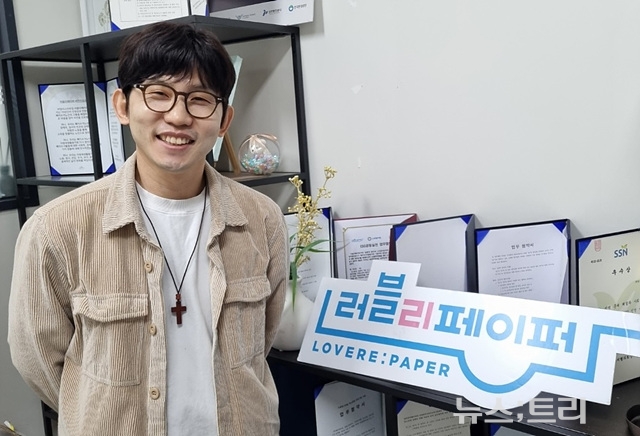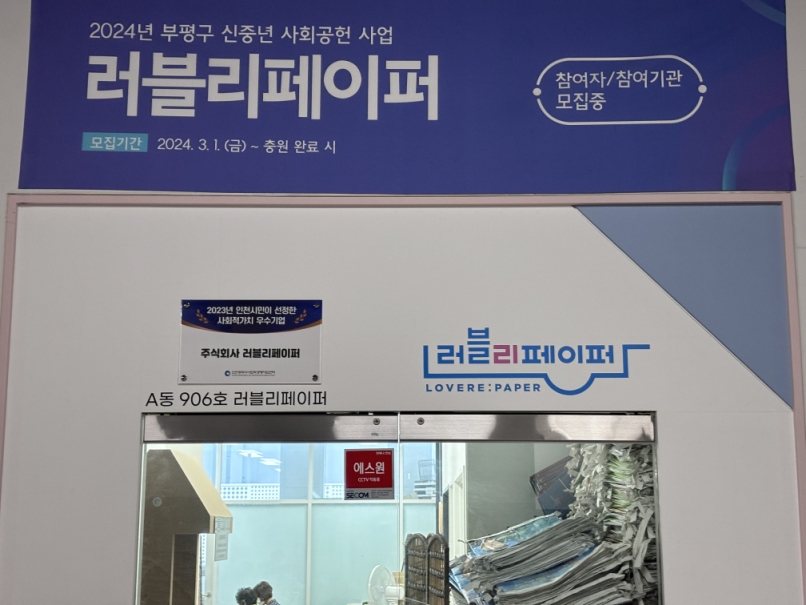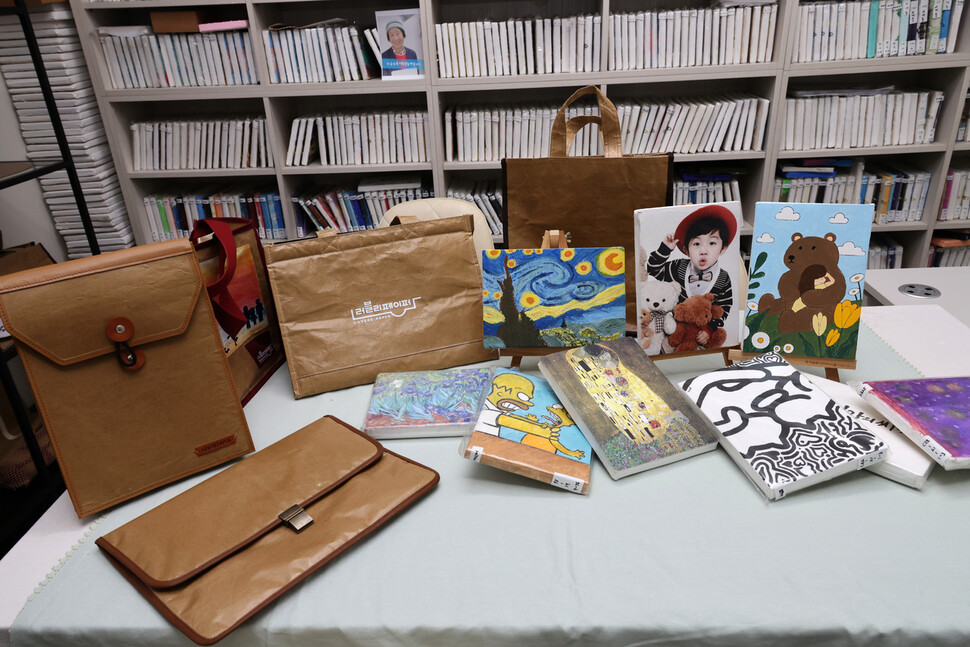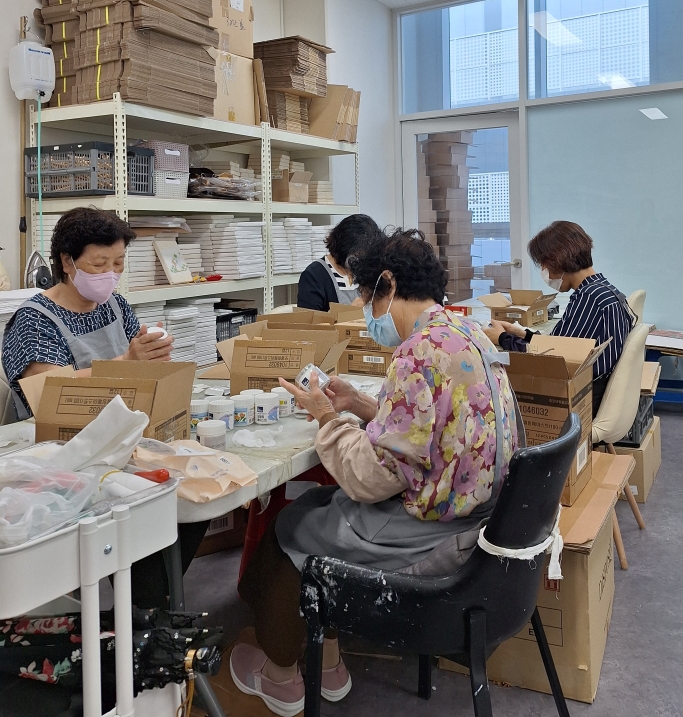[Case 25] From Waste to Worth: LOVERE:PAPER’s Mission for Older Resource Recovery Workers
From Waste to Worth:
LOVERE:PAPER’s Mission for Older Resource Recovery Workers
#. The struggles of older waste collectors in Korea
In Korea, it’s common to see older waste pickers on the streets. They spend their days collecting enough waste paper to fill a handcart, but the money they earn from selling their day’s work at junkyards is minimal. Many are at risk of road accidents, as they often work late at night or in the early morning, navigating car lanes while hauling heavy loads of waste.
In March 2022, a program titled “GPS and Handcarts: The State of Recyclable Paper Collection” aired on the Korean Broadcasting System (KBS). Produced in collaboration with the Korea Labor Force Development Institute for the Aged (KORDI), it was the first documentary to explore the challenges faced by older waste pickers. To shed light on the harsh realities of their lives, the production crew attached GPS trackers to the handcarts of 10 waste collectors, gathering detailed information about their working conditions.
The tracking revealed the following insights1:
1. Extensive working hours: On average, waste pickers work 11 hours and 20 minutes per day, walking a distance of 13 kilometers.
2. Graveyard shifts: To maximize their collection, many begin their work early in the morning and continue until late at night.
3. Unjust compensation: They earn only KRW 120 (USD 0.086)2 per kilogram of waste paper, forcing them to travel further to find better rates.
4. Inadequate meals: Many skip meals or cannot eat on time, prioritizing work even during meal breaks.
5. High exposure to accidents: They work on both car lanes and sidewalks, placing them at significant risk of road accidents.
The documentary sparked public interest in the hardships faced by waste pickers, prompting the Ministry of Health and Welfare to conduct a nationwide status survey of 1,053 waste collectors later that year. The ministry subsequently announced a "Support Plan for Older Waste Collectors." According to the survey, the collectors sold an average of 86.8 kg of waste paper and 18.8 kg of other recyclables per trip to junkyards, earning a modest monthly income of approximately KRW 160,000 (USD 114.30).
While their average annual income was KRW 742,000 (USD 530), their average monthly living expenses reached KRW 908,000 (USD 648.6), leaving them in deficit for an average of 3.4 months per year. Among the respondents, 83.8% identified as the main breadwinner, most of whom relied on the KRW 300,000 (USD 214.30) basic pension and earnings from waste picking as their primary sources of income.
How should their challenges be addressed from a human rights perspective, and what roles can the public and private sectors play in mitigating them? LOVERE:PAPER, a social enterprise, has been actively tackling this question by striving to improve both the working conditions and societal perception of older waste pickers. Established in 2017, the company supports older waste collectors by purchasing waste paper at above-market prices and repurposing it into upcycled goods. The profits from these sales are reinvested to employ older adults or provide essential goods for waste collectors.
In this issue, AGAC interviewed Mr. Ki Woo-jin, CEO of LOVERE:PAPER, to discuss the company's current initiatives and future vision, as well as to delve into the challenges faced by older recyclables collectors.
* * *
#. Reassessing the contributions of waste paper collectors
Photo 1: Located in Incheon, LOVERE:PAPER's main office also serves as its storage facility and workshop. (Photo by AGAC)
The main office and workshop of LOVERE:PAPER (LRP from here on out) are located in the Incheon Techno Valley U1 Center in Bupyeong, Incheon City. The company is composed of three younger employees, including its CEO, Mr. Ki, and six older workers. Its name combines "love" and "recycle," reflecting its mission to provide fair compensation for older waste pickers while introducing creative and eco-friendly uses for waste paper.3
The company pays KRW 300 (USD 0.20) per kilogram when purchasing waste paper from older waste pickers—four to five times the prevailing market rate. This approach stems from their recognition that market rates significantly undervalue the environmental and social contributions of the pickers. LRP also operates an upcycling business, utilizing secondhand rice sacks donated by catering and food service companies like CJ Freshway.
These materials are repurposed into a range of products, with most iconic creation being eco-friendly paper leather made from waste rice sacks and bed sheets. In 2022, the company patented this innovative material, which retains the texture of paper while being as durable as real leather, enhanced with an eco-friendly waterproof coating. LRP’s paper leather line includes various items such as laptop pouches, picnic mats, and cardholders. Additionally, the company supplies raw paper leather to other businesses interested in producing similar goods.
Another signature product of LRP is its collection of paper canvas paintings, jointly created by volunteer artists and older LRP staff members, who repurpose discarded boxes and fabric into unique, one-of-a-kind artworks. These pieces are either sent to the company’s regular subscribers as part of a subscription service or sold to individual consumers through its online store. Additionally, DIY kits for making paper leather pouches and paper canvases are available, allowing customers to enjoy the crafting experience themselves. These kits are popular among both businesses and schools: some companies donate the finished products from these kits to local welfare facilities for the elderly and children, while many schools incorporate them into resource recovery programs. Other notable products include notebooks made from recycled rice sacks. LRP is also currently developing eco-friendly honeycomb packing paper for sustainable packaging.
The company reinvests its sales profits to employ older adults as regular staff, providing them with a safe and stable work environment. These employees typically work four days a week, four hours per day, producing materials for paper leather and assembling canvases, earning around KRW 600,000 (USD 428.63) per month. LRP also supports elderly waste collectors in the community by supplying them with safety equipment and weather-resistant gear.
[Photo 2] Laptop cases, pouches, paper canvases available at LOVERE:PAPER
(Source: https://h21.hani.co.kr/)
[Photo 3] Older staff members at LRP crafting paper canvases (photo by AGAC)
#. Mr. Ki’s journey from teaching to entrepreneurship

[Photo 4] Mr. Ki Woo-jin, CEO of LOVERE:PAPER (Source: https://www.newstree.kr)
Mr. Ki, an alternative-school-teacher-turned-CEO, has shown a keen interest in the realities faced by older recyclers since a time when they attracted little attention or recognition, let alone any support or research effort from the government or relevant institutions. One summer day back in 2013, he realized it was his moment of truth when he saw an elderly paper collector struggling up a hill, balancing a pile of waste paper on his head and another tied around his waist, without even a handcart for assistance.
In December of that year, Mr. Ki established Good Paper, a non-profit organization with a mission to support older paper collectors through funds raised by selling donated recyclables to salvage yards and secondhand shops. Good Paper successfully raised awareness of its mission, inspiring various donors, including schools, tutoring centers, government facilities, and churches, to participate. However, Mr. Ki faced the problem of ever-declining prices for waste paper, which resulted in reduced donation funds.
To address this challenge, he developed a new business model in 2016, centered around selling artworks created by artists who donated their skills to paint on canvases made from discarded boxes. The first social media call for volunteer artists in this initiative received over 150 applications within hours of its posting. This model ultimately laid the foundation for the birth of LOVERE:PAPER.
#. Resource recovery workers, a new name for older waste collectors
At LRP, older paper collectors are referred to as “resource recovery workers”, a term highlighting their environmental and economic contributions to society, challenging the traditional perception of them as seniors merely struggling to make ends meet.
These individuals are often labeled as “elderly cardboard pickers” or “recyclables collectors,” terms that tend to evoke an image of vulnerable seniors in need.4 However, not all share this narrative of poverty. Some older individuals with sufficient means choose to collect recyclables as an active pursuit, indicating the diversity of stories behind this work. This has led to calls for support measures that focus specifically on those engaging in this job out of financial necessity. Addressing this issue, Mr. Ki firmly asserts that older resource recovery workers should no longer be viewed through a lens of charity. Instead, their valuable contributions to society must take center stage.
According to data from KORDI, older waste collectors are responsible for approximately 60.3% of paper recycling in residential areas (or 16.8% of total recycling across all categories). This contribution translates to an estimated savings of KRW 148 billion (USD 158.8 million) in recycling expenditures.
The title, “resource recovery worker,” aims to shift perceptions of elderly waste paper collectors, encouraging society to view them as valuable contributors with inherent rights, free from prejudice. Just as people recognize and appreciate plogging—jogging while picking up litter—as a positive trend, this term promotes the idea of elderly waste collectors as essential members fulfilling an important social role.
#. Comprehensive and holistic approaches, the key to tackling their challenges
Mr. Ki maintains that the challenges faced by older waste collectors extend beyond individual circumstances; they stem from systemic issues within society, the economy, and policymaking.
In the societal realm, LRP strives to transform public perceptions of older waste pickers and foster greater societal support for them. The company introduced the term resource recovery worker to that end, reflecting their role as contributors rather than recipients of aid. LRP seeks to redefine waste pickers as stakeholders in the recycling industry, who actively benefit the environment and society through their efforts. Mr. Ki emphasizes that the goal is not to eliminate waste pickers but to create a society where they can work safely and receive fair compensation. LRP is gradually but consistently advancing this mission by purchasing waste paper at above-market prices, selling upcycled goods, and offering lectures and training programs to promote awareness and drive change.
LRP is also actively working to address the financial hardships faced by older waste pickers. A 2023 census survey of 14,831 elderly waste pickers revealed that their average monthly income was approximately KRW 766,000 (about USD 550), significantly lower than the average monthly income of the broader elderly population, which was KRW 1.298 million (about USD 933) according to a 2020 national survey of older Koreans.
To achieve tangible results, the company adopted a social enterprise model, allowing it to directly employ older adults to produce upcycled goods in a safer and more stable working environment. Local authorities are making similar efforts by integrating older waste pickers into the formal job market, such as by connecting them with suitable roles or engaging them in government-operated recycling initiatives.
LRP’s work in the policy realm focuses on advocating for laws and ordinances to support waste pickers. In 2019, a proposal for the “Act on Support for Older Recyclable Collectors” was submitted to the 20th National Assembly but was ultimately discarded without substantive discussion when the assembly session ended. At the time, the Ministry of Health and Welfare and the Ministry of Justice expressed that the enactment of such legislation required careful deliberation to ensure equity between older and younger stakeholders, as well as between those in lower and higher income brackets.
Mr. Ki has led various events and initiatives, including conferences, campaigns, and collaborations with research institutes, recognizing the importance of bringing the challenges faced by waste pickers into the public spotlight to achieve tangible outcomes from policy advocacy. While legislative efforts have yet to succeed, they have generated positive ripple effects, such as the status and census surveys of waste pickers conducted by the Ministry of Health and Welfare, as well as support initiatives from local government bodies. Notably, Seoul City announced plans to improve rewards and working conditions for older waste pickers by establishing an organization in each of the city's 25 self-governing districts to facilitate job transitions for older adults.
Additionally, Seoul City has proposed providing subsidies to those who wish to continue collecting waste paper, supplementing their earnings from sales. The plan also includes distributing safety gear and offering coverage under workers' compensation insurance to mitigate potential safety risks. Furthermore, many local governments have outlined support measures for older recyclable collectors in ordinances (12 out of 17 provincial governments and 196 out of 229 municipal governments nationwide).5 These measures aim to ensure the health and safety of the collectors through initiatives such as tailored job placements via individual consultations, compensation for price differences relative to the standard purchase rate for waste paper, and the provision of safety equipment and essential goods.
#. A commitment to wider collaboration and a future-focused vision
LRP’s initiatives extend beyond Incheon City, where their worksite is located, and beyond Korea. With a vision set far into the future, they aim for a broader scope of collaboration, as reflected in the diverse plans they are currently developing.
The company is working toward establishing an incorporated association with Seoul City as its competent authority, aiming for its official launch in the fall of 2024. Within less than a month of posting the announcement, they successfully recruited all 100 members required for the inaugural general meeting. As an incorporated association, LRP will focus on supporting resource recovery workers from social, economic, and policy perspectives, while serving as a central hub for diverse initiatives and projects in collaboration with the public, private, and academic sectors.
The company is also preparing to establish the Support Center for Resource Recovery Workers, a community space dedicated to supporting waste paper collectors—the first of its kind in Korea. The center will operate in a commercial building under a long-term lease from the Incheon Urban Development Corporation, serving as a focal point for a wide range of support measures, including job placements and financial and emotional assistance programs. Specifically, the ground floor will function as a café and studio for training sessions or seminars aimed at promoting social participation among the local elderly, while the second floor will house a workshop and meeting space for participants. The café will employ resource recovery workers who have received barista training.
Another ongoing initiative is the nationwide lease-based distribution of electronic handcarts, which LRP is developing to enhance the safety of resource recovery workers.
These initiatives are just part of the many projects LRP is pursuing. The company continues to spearhead diverse collaborative efforts, including analytical research on working conditions for resource recovery workers, youth engagement campaigns, and ESG programs.
* * *
During the 4th ASEM Forum on the Human Rights of Older Persons: Present and Future, AGAC’s annual event held in July 2024, participants from National Human Rights Institutions (NHRIs) and civil society organizations in Southeast Asia made a notable recommendation: that the rights of older persons must be addressed through a comprehensive lens. The issues of old age, often compared to a tapestry, demand holistic approaches as they reflect the intricate interplay of various threads from earlier life stages, including family, society, economy, and culture.
In alignment with this perspective, LOVERE:PAPER is addressing the complexities surrounding older waste collectors, positioning itself as a significant advocate for the promotion of older persons’ human rights in Korean society.
------------------------------------------------------------------------------------------------------------
1) Source: KBS News Webpage, “GPS and Handcarts: the state of recyclable paper collection—4. Contributions of waste collectors revealed by GPS trackers” (https://news.kbs.co.kr/news/pc/view/view.do?ncd=5422719)
2) As of Feb. 2022. The prevailing rate dropped even further to KRW 50-60 per kg at a certain point in 2024.
3) The Korean pronunciation should technically be “leov-ri,” but they choose to pronounce it as “leo-vli,” mirroring the English word “lovely” to evoke the positive connotations associated with the term.
4) The conventional terms used to refer to waste collectors may face criticism for lacking appreciation and consideration for resource recovery workers as they tend to highlight social and financial vulnerabilities. While AGAC endorses the adoption of the new term, this article continues to use the conventional terms commonly employed by the media and government to maintain clarity for the public.
5) Summary of the census survey of older waste collectors by the Ministry of Health and Welfare (July 2024) (https://www.mohw.go.kr/board.es?mid=a10503010100&bid=0027&act=view&list_no=1482212&tag=&nPage=1)


